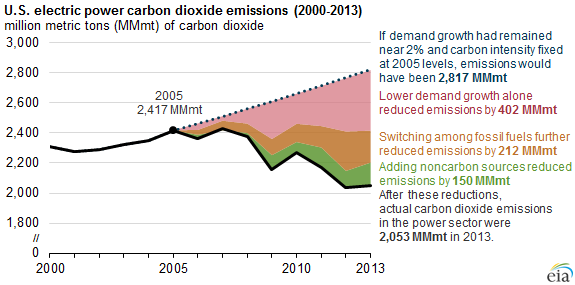Environment & Energy
Related: About this forumWhat Caused An Emissions Decline In The United States?
This is a longish article, but it's both thorough and very readable.
U.S. energy-related carbon dioxide emissions (CO2) have declined in five of the past eight years. This trend has been led by emissions reductions in the electric power sector. Electricity demand growth has been lower than in the past and at the same time the power sector has become less carbon intensive (measured as CO2 emitted per kilowatthour of generation). Total emissions from the electric power sector in 2013 totaled 2,053 million metric tons (MMmt), about 15% below their 2005 level.
U.S. electricity demand has decreased in recent years, as declines in the industrial sector continue to outweigh slight increases in residential and commercial demand. If electricity demand had continued to increase at its rate over the 1996-2005 period, emissions in 2013 would have been roughly 400 MMmt above actual 2013 levels, assuming carbon intensity remained constant.
The power sector has become less carbon intensive for two reasons: the substitution of less-carbon-intensive natural gas-fired generation, displacing coal and petroleum generation, and the growth in noncarbon generation, especially from renewables such as wind and solar.

In short, reduced demand growth for electricity accounted for 53% of the reduction in U.S. emissions from the power sector. That decrease came entirely from declines in industrial use of electricity.
Fuel switching (coal => natural gas) and renewables, which count as decreases in the carbon intensity of power generation, account for the rest of the decline. Also bear in mind that only 38% of all U.S. carbon dioxide emissions come from the power sector.

Summary Figure 1 in the Nature Communications paper. From 2007 to 2009, when carbon emissions declined the most, 83 percent of the decrease was due to economic factors, including consumption and production changes. Just 17 percent of the decline related to changes in the nation's fuel mix.

Contributions of different factors to changes in U.S. CO2 emissions specific to different final demand components, 1997-2013
Detailed Figure 3 and summary Figure 1 reveal that consumption volume (red line) and population (yellow line) are by far the largest positive contributors to U.S. CO2 emissions.
Are we surprised? Not at all. And there is every reason to believe that this observation is also true of every developed or developing nation on Earth. One of the co-authors had this to say:
Steven Davis and his co-authors conclude that without new policies that limit CO2 emissions, it may be difficult to keep emissions down as the U.S. economy continues to recover. And in fact, U.S. CO2 emissions rose in 2013 and 2014.
"Lots of people are enthusiastic about the fact that we suddenly have affordable and abundant supplies of natural gas, including many who are concerned about the climate," Davis said. "Our study shows the overriding importance of other factors and warns against wishful thinking."
This analysis supports what I've been saying since before 2008: The main driver of emission reductions is economic slowdown. In this analysis, growth reduction appeared to be 2.5X more effective than adding renewables in terms of reducing power-sector emissions.
So while we're getting all excited about adding windmills, we shouldn't forget to crash the economy...
daleanime
(17,796 posts)we have to change the way we live.
Bookmarked.
djean111
(14,255 posts)people are not buying as much "stuff", manufacturing has left the country, all of my thoughts were related to a crashed economy that has not recovered for everybody by a long long shot, and likely never will, what with the TPP.
The only way I see emissions rising now, really, is if the TPP and TTIP enable other countries to come in and build/reopen factories and gut our emission regulations as they cut into profits. Maybe more of those yummy tar sands processing sites.
GliderGuider
(21,088 posts)There is no problem in the world that would not be significantly improved by a rapid 50% drop in its human population and a 50% decline in the per-capita income of the remaining half...
FBaggins
(26,757 posts)If the second... feel free to send the check to me.
GliderGuider
(21,088 posts)I took a vow of poverty when I found out about the clusterfuck (my income is down 50% and my wealth is down 100% over the last decade) and my child-free status is inherent in my VHEMT membership. On edit: My lower income has cut my CO2 footprint in half, and by not procreating I have eliminated about 4000 tonnes of CO2 from the planet's future.
And you? Are you now part of the solution, or are you still determined to be part of the problem?